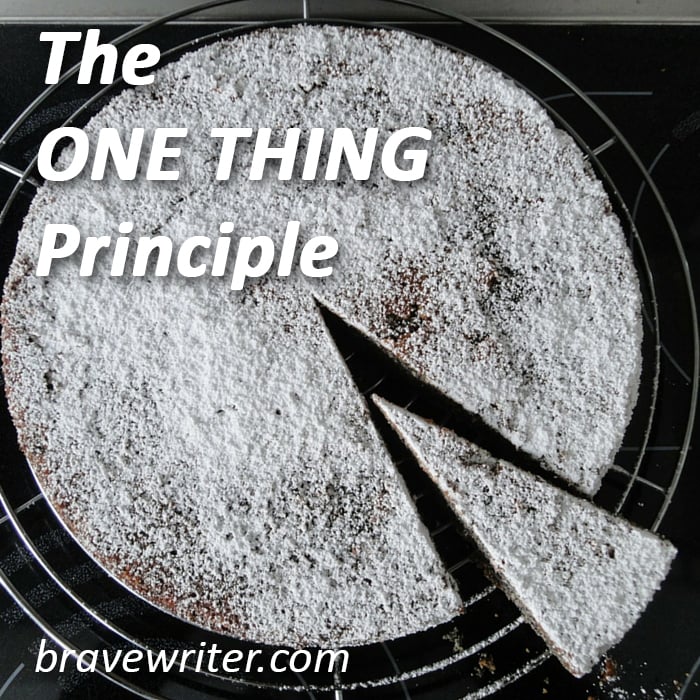The One Thing Principle

I haven’t posted about this for awhile, but it’s critical to good home education, good writing practice, good living! Before you read, take a deep breath. Take another. Maybe pour a second cup of tea.
Did you know that you are more likely to feel successful in homeschooling if you do one thing really well today (invest in it, spend energy on it)? If you let other things go and are fully present for one thing, you’ll feel like you got a lot done. Conversely, if you do a whole bunch of things in a hurry, covering all the material, you will feel discouraged like you didn’t get enough done.
Depth, not breadth, creates momentum in the homeschool. Here’s how you can shift gears to doing one thing at a time… well.
The discussion of how to create a flexible routine as well as how to create a home context conducive to nurturing relationships prompts me to revisit a plank of the Brave Writer philosophy: The One Thing Principle. Some of you already know it well. Others of you are new to Brave Writer so this will help you begin to shift the paradigm from which you teach and guide your kids.
Remember: we are home educators. We are not recreating school. One of the biggest advantages to being at home is the ability to go in-depth when studying or pursuing an interest. This is the key principle to help you do just that guilt free. Enjoy!

When was the last time you really tasted the food you ate? If you’re like me and millions of parents, you wolf down your meals in an attempt to clean your plate before someone in the family needs seconds, needs a face-wiped, needs to be breastfed, needs you on the phone.
It’s easy to run through the homeschool day the same way. Everyone’s doing math. Good. In just ten minutes I’ll get the older two started on spelling. While they’re spelling, I’ll read with the eight-year-old and nurse the baby. Then I’ll make lunch and think about which creative project will go with the history novel.
As you race along, you might even have the strange feeling of not having done anything worthwhile, even though you are exhausted and have been pushing the family at breakneck speed. There’s a sense in which we “hover” above our lives rather than living right inside them when we’re filled with obligations, good ideas, lots of children, and the endless demands of email and phone calls that intrude on our best plans.
We also feel pressure—pressure to complete assignments, books, courses, and projects, and worry that we won’t have done enough of any of it. So even a completed project or worksheet or novel is not relished because we think about all the things we haven’t done yet instead. What an awful trap!
To stop the madness, you have to change how you see the way you spend time. I like to tell Brave Writer parents to savor experiences and learning opportunities rather than rushing through them. As much as I have emphasized the need to slow down, moms continued to feel they weren’t doing enough. That’s when it dawned on me that we needed to refine what it means to “slow down.”
The solution? Do One Thing!
Ask yourself: What would happen if I only did ONE thing well tomorrow?
What if you focused all your energy and attention on one important idea/activity/project/math concept or novel? For instance, what if you set up the conditions to enjoy reading one Shakespeare story by Leon Garfield?
- You could pick the story the night before.
- You could look over the difficult to pronounce names and try saying them.
- You could find a passage for copywork to be used later in the week.
- You could google a few facts about the Bard and print them out to read over breakfast.
- You might print out a story synopsis to help you answer questions if your kids get confused while you are reading.
Let’s look at what happens the next day if you really were to focus on One Thing.
Here’s what you do:
The next morning, toast some English muffins, serve with black tea, and set them on the kitchen table. While everyone is slurping their tea and putting in too many teaspoons of sugar, read the story aloud, sharing the gorgeous illustrations as you read. Then ask everyone to pronounce the names after you, and pause to laugh at Shakespeare’s sense of humor. Explain a few of his obscure word choices, and make a little diagram of how the characters are related to each other. At the end, read the interesting fact sheet about old Will and marvel at his accomplishments.
When you’re finished reading, savoring, drinking tea and eating muffins, when you have understood the story and have thought about who Shakespeare is, when each child has had a chance to talk about the story if he or she wants to, you close up shop and turn on the TV for a sitcom. Or perhaps you take a walk or play outside, or do some email while your kids jump on the couch like a trampoline.
Then a little later at lunch time, reminisce about the story and why it was so enjoyable. See what part of the story everyone thought was sad, or funny, or creative. Suggest ordering the film version on Netflix or acting out one scene or comparing this story (orally) to one of Shakespeare’s other plays you’ve read/seen before. Make the most of this rich experience before rushing off to the next one.
As an adult, take time to actually enjoy the story. It’s fine that you enjoy your children’s joy, but it’s even more important that you find yourself focused on the story, its language, the creativity of it, the timelessness of the ideas. You must discipline yourself to not think about the unpaid bills, the dinging bell of new email, the ring of the phone or the tug of unfolded laundry. You must not worry that math is not being studied or that your youngest still can’t read.
It is time for Shakespeare and that’s it. When you have enjoyed and relished Shakespeare, you may then go on to one more thing.
Follow the same process for another homeschool experience you want to have but put off or don’t enjoy or feel you’ve neglected.
Take time to:
1. Prepare (ahead of time). Plan a date, purchase, make copies, organize, think about.
2. Execute (day of). Follow through with enough time to invest deeply without distraction.
3. Enjoy (kids and you). Let yourself forget everything else but that experience/lesson. Be here now.
4. Reminisce (later that day or the next). Talk about what was fun, remember humor, honor connections.
If you build positive experiences around copywork, dictation, Shakespeare, poetry, writing, reading, observing, narrating, conversing, acting, nature, art and more, slowly, over time, one at a time, without feeling you are getting behind, you will naturally build momentum in your homeschool. You’ll discover that you do more things that nourish your family and will revisit the ones that are especially rewarding.
More importantly, your kids will learn to trust you. They’ll believe that you have rich experiences prepared for them that are worth doing. Think about that. Isn’t our biggest struggle “getting our kids to do what they should”? What if they knew that if you said, “Let’s do _______ today” their reaction would be: “That will be fun!” (or interesting or worth doing)? Wouldn’t that make a world of difference?
You can follow the one thing principle for any lesson, topic, activity or idea. Overlapping between subject matter happens naturally when you invest this way. Subjects you didn’t even intend to cover are a part of deep investment in any topic. Allow yourself to trust the process. Start with One Thing (the one thing you are dying to do with your kids but keep putting off).
Make your plan today!


















Julie,
Great post and an awesome reminder for all to slow down the pace of life and enjoy the experience as it is occurring. I love your line about the completion of the One Thing: “…you may then go on to one more thing.” Savor what you are doing and then move on to the next event with the same sole-focus.
Thanks for sharing your wisdom!
Michelle
Julie,
I’m not a homeschooler, but this principle seems to apply to so much of a mom’s life. We’re rushing so fast from this thing to the next we barely notice where we’ve been or what we’ve done.
Funny thing is that my fantasy of the benefits of homeschooling is that you would have time to dive deeply and enjoy ‘just one thing.’
[…] The One Thing Principle. I’m so glad Julie re-posted this. I really needed to read this. I’ve been feeling scattered and behind. […]
Thank you, Julie. I need some lessons over and over again.
I’ve been feeling scattered and behind. Multi-tasking is starting to eat my brain.
[…] and get into the things I am doing. The now is overshadowed by the distractions of the then. The One Thing Principle (via Handmade Homeschool) is a call to homeschoolers (and this can apply to everybody else, too!) […]
I’ve already been doing this for about a year. I decided last year after reading “The Simple Living Guide” to really simplify my life and devote more time to my children. So instead of trying to do tons of school, we focus on one or two main things every day and then do some crafts and go outside and enjoy nature. We now have lots going on outside with gardens and chickens and stuff, so we are always busy out there and it feels good to get things done on the homesteading front. I count that as school work!! :0)
[…] The One Thing Principle at Brave Writer, found via Handmade Homeschool. Could it really be so simple? […]
Is there a list of new games for trampoline? Looks to me that all those games are here for a while now and all around the web. Beside that, I like your blog layout. It looks cool for fitness web sites.
[…] and execute the One Thing you’ve been meaning to do all fall but never got to it. Check out our blog entry on how to focus on one thing at a […]
[…] a really wonderful post by Julie @ Brave Writer full of tips for making sure January is a good month in your homeschool. cuddle on the couch, read books, focus, really, focus on getting one thing right. […]